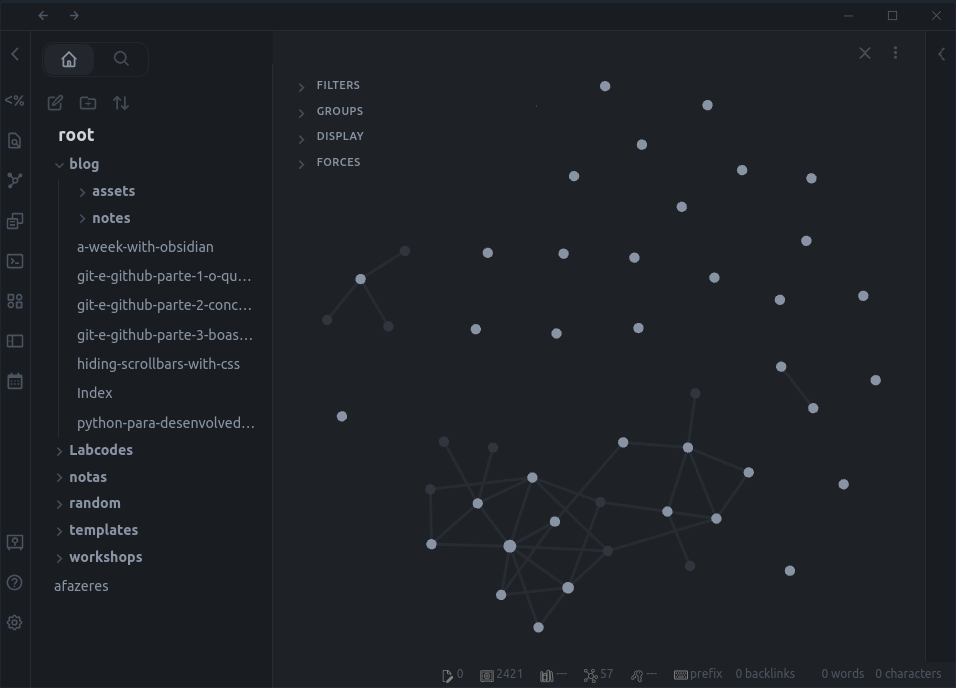A week with Obsidian
Luciano Ratamero
2022-03-26

It's been a week since I started using Obsidian. It sells itself as a "second brain" app, and I must say: until now, it has not disappointed. Come with me and you'll see that it's not just about productivity, but about being healthier. :]
What is Obsidian?
Obsidian is mostly a text editor, and it was made for you to organize your thoughts, research topics, writings, anything. The general idea is that you write simple Markdown files, which is plenty for most writing scenarios, and link them together, effectively making a knowledge base.
That way, you can slowly build a graph of what you know about a topic. The simple linking of your documents is enough to make a rough map of what's on your brain.
Why would I need that?
Well, I can't say about your habits, but I'm using it for three main areas:
- researching and publishing about topics I like (this blog is built based on my Obsidian notes!);
- work related issues, like keeping notes about meetings, making new workshops or talks, keeping track on how people I mentor are evolving, what has been most effective, etc.;
- life things, like mood tracking, to-dos, and a general daily notes on what I've done and how I was feeling that day.
Researching
Obsidian is almost perfect for research notes, be them academic or not. The two important features here are forward-referencing notes, and the graph view.
To make a link between notes, you just need to wrap them with [[double brackets]]. If the note exists, you're done, the link is made; but if the note does not exist, it creates the link anyway, and when you click it, it opens up a new note with the link's title. It seems so simple, and it is.
This allows us to preemptively select certain words that may be popping out too much, or may be important for the subject. It also makes us remember that maybe a specific idea or topic needs more work.
When you're done with your notes, or if you want to have a better idea on what the main topics are, you can open the graph view.

It not only helps a lot on visualizing how things relate to each other, but it gives us a better sense on how much we've accomplished with our learnings - and I love this feeling of accomplishment. It gives me more confidence that I really worked hard on something, and that, if I need my notes on that, they're there.
Oh, and I think I don't need to tell you about the benefits of writing things down, right?
Work related notes
I need to be frank: my memory sucks. It's so bad. To mitigate that...characteristic, a couple of years ago I started taking small notes, even if not entirely accurate, about what happened at meetings, or about project roadmaps, anything I thought that was useful or that I was sure I'd forget.
It already helped me a lot, but sometimes it was a bit hard extracting useful, long time data from the notes I had. If I wanted, for example, to know what were the areas that people I've mentored had the most trouble with, I'd have to go through all the notes, for all people, and reread everything, making even more notes. And I'm too lazy for that.
Forward-referencing links help me a lot here as well. I can see pretty quickly how many people had the same problem, or how much they talked about it, just by looking at the graph. This kind of information is priceless for people that teach, write, or make content.
life... things
This may be the area Obsidian had the most impact with, and the advantages will probably keep getting bigger with time. Before Obsidian, I never kept notes about myself, never had a tool to track my mood, or what brought me down or made me happy.
Now, it's pretty easy for me to, you know, sit down and write about shit. Just write about shit. The good and the bad. And just by referencing things, you start to notice patterns emerging, be it bad/good habits, situations, or people that help me feel better or make me feel bad.
I started to understand a bit better what are the things I love, how to to them, why I do them. And while the other two areas were about productivity, this one is not. This one is about mental health, about keeping in touch with yourself and others, and maybe a little bit about recording history too; so that when I'm 40, even if Obsidian is not a thing anymore, or my life has completely changed, I still have notes.
Notes about what I learned. Notes about what work was all about. Notes about love.